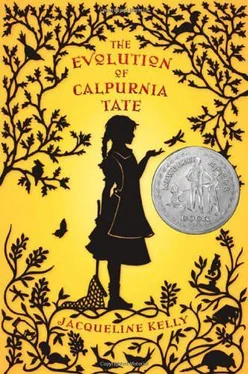Jacqueline Kelly - The Evolution of Calpurnia Tate
Здесь есть возможность читать онлайн «Jacqueline Kelly - The Evolution of Calpurnia Tate» весь текст электронной книги совершенно бесплатно (целиком полную версию без сокращений). В некоторых случаях можно слушать аудио, скачать через торрент в формате fb2 и присутствует краткое содержание. Город: New York, Год выпуска: 2009, ISBN: 2009, Издательство: Macmillan : Henry Holt and Company, Жанр: Детская проза, на английском языке. Описание произведения, (предисловие) а так же отзывы посетителей доступны на портале библиотеки ЛибКат.
- Название:The Evolution of Calpurnia Tate
- Автор:
- Издательство:Macmillan : Henry Holt and Company
- Жанр:
- Год:2009
- Город:New York
- ISBN:978-0-8050-8841-0
- Рейтинг книги:5 / 5. Голосов: 1
-
Избранное:Добавить в избранное
- Отзывы:
-
Ваша оценка:
- 100
- 1
- 2
- 3
- 4
- 5
The Evolution of Calpurnia Tate: краткое содержание, описание и аннотация
Предлагаем к чтению аннотацию, описание, краткое содержание или предисловие (зависит от того, что написал сам автор книги «The Evolution of Calpurnia Tate»). Если вы не нашли необходимую информацию о книге — напишите в комментариях, мы постараемся отыскать её.
The Evolution of Calpurnia Tate — читать онлайн бесплатно полную книгу (весь текст) целиком
Ниже представлен текст книги, разбитый по страницам. Система сохранения места последней прочитанной страницы, позволяет с удобством читать онлайн бесплатно книгу «The Evolution of Calpurnia Tate», без необходимости каждый раз заново искать на чём Вы остановились. Поставьте закладку, и сможете в любой момент перейти на страницу, на которой закончили чтение.
Интервал:
Закладка:
I got out of bed, put on my slippers, and slid around the perimeter of the room, careful to avoid the floorboard in the middle that cracked like a pistol shot. The stairs were also notoriously loud, so I pleated up my white cotton nightgown and slid down the banister as I’d done my whole life. It was fast and quiet transportation, but I misjudged in the dark and braked late and hit the square newel post hard enough to earn myself a nice blue bruise on my behind, a two-weeker, at least.
The moon lit my way to the stable. I crept to the door and looked inside. Harry curried Ulysses in the lantern light and hummed a song that I recognized with a lurch as “I Love You Truly.” He looked so happy, happy in a way I’d never seen him look before.
“Harry,” I whispered.
He turned and his face grew hard. “What are you doing here?” he said. “Go away. Go to bed.” He went on brushing the horse.
Oh, that look.
There had been times in the past when I’d been in some kind of mild trouble with him and, uncomfortable as those times had been, they had always passed. I had basked safe in the knowledge that I was forever his favorite; I took his love on faith and wrapped it around me like a blanket. But this was different. I had fundamentally injured him while trying to protect us, to protect him. No. If I were being honest, to protect myself. And I felt the first icy grip of grief around my heart.
Stunned, I backed out of the circle of light and stood alone under the moon. A hiccup—or sob—escaped me. I turned and stumbled back to the house on rubbery legs. I made it through the front door but then foundered on the bottom stairs. That’s where Harry found me half an hour later, a huddled heap of misery in a white nightgown, sniffling in the dark, too upset to move, with only Idabelle, who had padded out from the kitchen, for company. I could just see him, standing with his hands on his hips.
“I’m sorry, Harry,” I whispered.
“There are some matters in this world that are not for children. They are for grown-ups,” he said.
I had never thought of Harry as a grown-up before. My brothers and I had always been children together. But the way he said the word, I knew that at that moment he had crossed some invisible border into a different land, and he would not be returning to our childish band again.
“I didn’t mean to get you in trouble,” I moaned.
“Yes, you did. I don’t understand why you would do this to me.”
I wanted to cry out, For the family! For you! But I knew deep down that it was for me, and I was ashamed.
The grandfather clock chimed three times in the dark.
“You should go to bed,” he said, in a flat voice.
I clung to the fact that these words were, despite their coldness, less harsh than the words he had spoken to me in the barn. Surely it would be all right. He would put his arm around me and take me upstairs and tuck me in.
But he did not. Instead, he whispered, “I wish you hadn’t done that,” and walked past me up the stairs, leaving me to contemplate the carnage of my brief command. My campaign had been successful, and it had cost me my brother. It wasn’t until the clock bonged four that I could make myself creep up to bed.
The next morning, I was so exhausted that I stayed in bed, feigning illness and dozing fitfully. It wasn’t difficult to convince Mother that I was ill, what with my listlessness and lingering hives. She and Viola sent a steady stream of beef tea and baking soda poultices to my room. Late in the afternoon there was talk of tonics and purgatives and cod-liver oil, but at that point I managed to rally and take some plain boiled chicken, averting such drastic management. Any child who stayed in bed for more than one day in our house was dosed with cod-liver oil. The mere prospect of it often wrought a near-miraculous recovery.
Travis came in to lend me his kitten Doc Holliday to cheer me up (Jesse James was indisposed). J.B. climbed up on the bed and cuddled with me awhile to make me feel better. Sul Ross brought me a bouquet of straggly wildflowers for my nightstand and proudly showed me the mark on his trunk where I’d elbowed him. I didn’t show him my own much more impressive bruise on account of its indiscreet location.
Harry didn’t visit.
The following morning, I staggered down to breakfast. I was relieved to see that Harry at least glanced at me. Before we left the table and scattered for the day, Mother said, “We will be having guests Friday evening, so you will all be ready for inspection at quarter past six.”
“Drat,” said Granddaddy. “Who is it this time?”
“Grandfather,” said Mother, “we wouldn’t dream of imposing on you if you have a prior engagement.”
Mother knew Granddaddy didn’t have a prior engagement, but there was always the siren song of his laboratory or the library. My mother could only hope. I noticed that she never exactly encouraged Granddaddy’s presence at her evening entertainments, or “soirees” as she called them. He was always the model of old-fashioned manners, of course, but he could go off on strange and interesting tangents of conversation that I think Mother didn’t always find suitable in polite company. Fossils, for example, and whether their existence disproved the Book of Genesis; Brother Mendel’s experiments on the sexual reproduction of the sweet pea; the fallacy of laudable pus. Once I had seen my mother shudder on overhearing him expound to a group of ladies on the mating posture of order Opiliones, or daddy longlegs. Then there were his predictions for the future, how man would one day build flying machines and travel to the moon, prognostications that were met with the sly indulgence afforded old codgers, although I secretly agreed with him and could imagine it happening a thousand years hence.
“Who’s coming, ma’am?” said Sam Houston.
“The Locketts, the Longorias, Miss Brown. Reverend and Mrs. Goodacre. And a Miss Minerva Goodacre,” said Mother, examining her butter knife.
Uh-oh. I looked at Harry, who was also interested in his cutlery, studying it as if he’d never seen it before. I swallowed hard. What to do? I consoled myself that I had three more days to think about it, brooding in my tent like Napoleon.
Every time I passed Harry on the stairs for the next few days, I smiled stiffly. He remained impassive. I chose to interpret his not actually scowling at me as a good sign.
Friday came and I still had no plan. Instead I washed and dried my hair. Then I sat at my vanity and glumly counted one hundred strokes of the hairbrush. I put on my best lawn dress and kid boots, the ones I’d worn to the music recital, and tied a sky-blue ribbon in my hair, the color Harry liked best on me. I went downstairs to join the others.
Harry looked handsome and reeked of the competing scents of lavender pomade and bay rum toilet water. A live undercurrent of excitement fizzed in him, and he softened to the point of giving me a grin. We lined up in the hall by age, Sam Houston gagging as he inhaled the fumes coming off Harry. Mother came down to inspect us. She wore her emerald silk with the short train, one of her best, and the train made a faint whish-whish sound as she walked. She looked at our boots, our teeth, our fingernails.
“Calpurnia, for heaven’s sake,” she said. “Stand up straight. What’s the matter with you? Jim Bowie, those nails won’t do. You look like you’ve been grubbing in the garden. Calpurnia, take him and fix him.”
I led J.B. off to the bathroom, grateful for something to do. As I scrubbed him, he said, “Is Harry getting married?” This startled me so much I dropped the nail brush.
“Wherever did you get that idea?”
“I heard Mother talking about it. Is Harry going away?”
Читать дальшеИнтервал:
Закладка:
Похожие книги на «The Evolution of Calpurnia Tate»
Представляем Вашему вниманию похожие книги на «The Evolution of Calpurnia Tate» списком для выбора. Мы отобрали схожую по названию и смыслу литературу в надежде предоставить читателям больше вариантов отыскать новые, интересные, ещё непрочитанные произведения.
Обсуждение, отзывы о книге «The Evolution of Calpurnia Tate» и просто собственные мнения читателей. Оставьте ваши комментарии, напишите, что Вы думаете о произведении, его смысле или главных героях. Укажите что конкретно понравилось, а что нет, и почему Вы так считаете.












